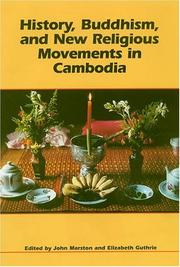| Listing 1 - 10 of 69 | << page >> |
Sort by
|
Book
ISBN: 9814380369 981303520X Year: 1989 Publisher: Singapore : Institute of Southeast Asian Studies,
Abstract | Keywords | Export | Availability | Bookmark
 Loading...
Loading...Choose an application
- Reference Manager
- EndNote
- RefWorks (Direct export to RefWorks)
The fundamental premise of this study is that the Buddhist sangha and Buddhist teachings play a key symbolic role in legitimating the exercise of secular power in Thailand. The author argues that a clear appreciation of the political legitimatory function of Buddhism provides the key to understanding the major theoretical and administrative changes that have taken place within Thai Buddhism in this century.
Book
ISBN: 9814843741 9814843733 Year: 2019 Publisher: Singapore : ISEAS-Yusof Ishak Institute,
Abstract | Keywords | Export | Availability | Bookmark
 Loading...
Loading...Choose an application
- Reference Manager
- EndNote
- RefWorks (Direct export to RefWorks)
The past two decades have been a time of turmoil in Thailand's religious affairs. Disputes, debates and controversies concerning the administration of Buddhism, Thailand's national religion by tradition, have erupted more and more frequently. This chronic and unresolvable conflict originates from Thai Buddhists' inability to achieve a broad consensus on religious reform. Under the governance of the National Council for Peace and Order (NCPO) junta that came to power in 2014, the fierce struggle concerning Buddhist reform seemed to subside. Upholding and protecting Buddhism might be a duty of traditional Thai rulers who desire for a source of political legitimacy, but the NCPO's decisive actions concerning Buddhist institutional reform were not merely reflected respect for this tradition, but were closely intertwined with the dynamic of contending forces in Thailand's long-troubled religious politics. Conflicts between the influential religious nationalists and the Thai Sangha convinced the military government of the need to act, for the sake of national security and political stability.
Book
ISBN: 9780231551939 0231551932 Year: 2020 Publisher: New York, NY
Abstract | Keywords | Export | Availability | Bookmark
 Loading...
Loading...Choose an application
- Reference Manager
- EndNote
- RefWorks (Direct export to RefWorks)
Late imperial Chinese Buddhism was long dismissed as having declined from the glories of Buddhism during the Sui and Tang dynasties (581–907). In recent scholarship, a more nuanced picture of late Ming-era Buddhist renewal has emerged. Yet this alternate conception of the history of Buddhism in China has tended to focus on either doctrinal contributions of individual masters or the roles of local elites in Jiangnan, leaving unsolved broader questions regarding the dynamics and mechanism behind the evolution of Buddhism into the renewal.Thriving in Crisis is a systematic study of the late Ming Buddhist renewal with a focus on the religious and political factors that enabled it to happen. Dewei Zhang explores the history of the boom in enthusiasm for Buddhism in the Jiajing-Wanli era (1522–1620), tracing a pattern of advances and retrenchment at different social levels in varied regions. He reveals that the Buddhist renewal was a dynamic movement that engaged a wide swath of elites, from emperors and empress dowagers to eunuchs and scholar-officials. Drawing on a range of evidence and approaches, Zhang contends that the late Ming renewal was a politically driven exception to a longer-term current of disfavor toward Buddhism and that it failed to establish Buddhism on a foundation solid enough for its future development. A groundbreaking interdisciplinary study, Thriving in Crisis provides a new theoretical framework for understanding the patterns of Buddhist history in China.
Buddhism --- Buddhism and politics --- History

ISBN: 0824826663 9780824828684 0824828682 9780824826666 Year: 2004 Publisher: Honolulu: University of Hawai'i Press,
Abstract | Keywords | Export | Availability | Bookmark
 Loading...
Loading...Choose an application
- Reference Manager
- EndNote
- RefWorks (Direct export to RefWorks)
This volume showcases some of the most current and exciting research being done on Cambodian religious ideas and practices by a new generation of scholars from a variety of disciplines. The different contributors examine in some manner the relationship between religion and the ideas and institutions that have given shape to Cambodia as a social and political body, or nation. Although they do not share the same approach to the idea of "nation," all are concerned with the processes of religion that give meaning to social interaction, which in some way includes "Cambodian" identity. Chapters touch on such far-reaching theoretical issues as the relation to religion of Southeast Asian polity; the nature of colonial religious transformation; "syncretism" in Southeast Asian Buddhism; the relation of religious icon to national identity, religion, and gender; transnationalism and social movements; and identity among diaspora communities.While much has been published on Cambodia's recent civil war and the Pol Pot period and its aftermath, few English language works are available on Cambodian religion. This book takes a major step in filling that gap, offering a broad overview of the subject that is relevant not only for the field of Cambodian studies, but also for students and scholars of Southeast Asian history, Buddhism, comparative religion, and anthropology.
Buddhism --- Buddhism and politics --- Cambodia
Book
ISBN: 9789971695729 9971695723 Year: 2012 Publisher: Singapore: NUS Press,
Abstract | Keywords | Export | Availability | Bookmark
 Loading...
Loading...Choose an application
- Reference Manager
- EndNote
- RefWorks (Direct export to RefWorks)
The Buddhist monk Buddhasdasa Bhikku (1906-1993) injected fresh life into Thai Buddhism by exploring and teaching little known transcendent aspects of the religion. His investigations excited both monks and lay people, and gave rise to the vigourous discussion in shops, temple yards and newly founded Buddhist associations. Moreover, he was a prolific author, who produced a rich array of publications that are indicative of his popularity and the impact of his teachings. While these discussions included serious exchanges on doctrine and practice, they also included jokes and light humor, criticisms of weak evidence for certain positions, and a defamation campaign arising from rumors that Buddhadasa was a communist sympathizer. Buddhadasa's thoughts and historical context coincide with the general picture of "modern Buddhism" and he may be seen as an agent of "Buddhist modernity," but he worked predominantly in Thailand through the medium of the Thai language, and he contributed much more significantly to Thai Buddhists than to Buddhist practice outside the country. An enormous amount of material relating to Buddhadasa Bhikkhu has been captured in religious journals and in numerous "pocket books" aimed at a general audience. Departing from the classical method of studying Buddhism through philology, Tomomi Ito's account of Buddhadasa Bhikkhu draws on this popular literature and on conversations with a broad spectrum of the people involved in these discussions to develop an account of Buddhism as it is experienced by Thai people. The result is a lively intellectual and social history of contemporary Thai religion and society built around the life of an exceptional monk who captured the interest of Buddhists pursuing spiritual depth in the context of the ideological conflicts of the Cold War.
Buddhism --- Buddhism --- Buddhism and politics

ISBN: 0226789500 Year: 1992 Publisher: Chicago (Ill.) : University of Chicago press,
Abstract | Keywords | Export | Availability | Bookmark
 Loading...
Loading...Choose an application
- Reference Manager
- EndNote
- RefWorks (Direct export to RefWorks)
Book
ISBN: 1441620079 0824861760 Year: 2008 Publisher: Honolulu : University of Hawaii Press,
Abstract | Keywords | Export | Availability | Bookmark
 Loading...
Loading...Choose an application
- Reference Manager
- EndNote
- RefWorks (Direct export to RefWorks)
The study of Cambodian religion has long been hampered by a lack of easily accessible scholarship. This impressive new work by Ian Harris thus fills a major gap and offers English-language scholars a booklength, up-to-date treatment of the religious aspects of Cambodian culture. Beginning with a coherent history of the presence of religion in the country from its inception to the present day, the book goes on to furnish insights into the distinctive nature of Cambodia's important yet overlooked manifestation of Theravada Buddhist tradition and to show how it reestablished itself following almost total annihilation during the Pol Pot period.Historical sections cover the dominant role of tantric Mahayana concepts and rituals under the last great king of Angkor, Jayavarman VII (1181-c. 1220); the rise of Theravada traditions after the collapse of the Angkorian civilization; the impact of foreign influences on the development of the nineteenth-century monastic order; and politicized Buddhism and the Buddhist contribution to an emerging sense of Khmer nationhood. The Buddhism practiced in Cambodia has much in common with parallel traditions in Thailand and Sri Lanka, yet there are also significant differences. The book concentrates on these and illustrates how a distinctly Cambodian Theravada developed by accommodating itself to premodern Khmer modes of thought. Following the overthrow of Prince Sihanouk in 1970, Cambodia slid rapidly into disorder and violence. Later chapters chart the elimination of institutional Buddhism under the Khmer Rouge and its gradual reemergence after Pol Pot, the restoration of the monastic order's prerevolutionary institutional forms, and the emergence of contemporary Buddhist groupings.
Political atrocities --- Buddhism and politics --- Buddhism --- History.
Book
ISBN: 0824844343 Year: 2004 Publisher: Honolulu : University of Hawaii Press,
Abstract | Keywords | Export | Availability | Bookmark
 Loading...
Loading...Choose an application
- Reference Manager
- EndNote
- RefWorks (Direct export to RefWorks)
This volume showcases some of the most current and exciting research being done on Cambodian religious ideas and practices by a new generation of scholars from a variety of disciplines. The different contributors examine in some manner the relationship between religion and the ideas and institutions that have given shape to Cambodia as a social and political body, or nation. Although they do not share the same approach to the idea of "nation," all are concerned with the processes of religion that give meaning to social interaction, which in some way includes "Cambodian" identity. Chapters touch on such far-reaching theoretical issues as the relation to religion of Southeast Asian polity; the nature of colonial religious transformation; "syncretism" in Southeast Asian Buddhism; the relation of religious icon to national identity, religion, and gender; transnationalism and social movements; and identity among diaspora communities. While much has been published on Cambodia's recent civil war and the Pol Pot period and its aftermath, few English language works are available on Cambodian religion. This book takes a major step in filling that gap, offering a broad overview of the subject that is relevant not only for the field of Cambodian studies, but also for students and scholars of Southeast Asian history, Buddhism, comparative religion, and anthropology. Contributors: Didier Bertrand, Penny Edwards, Elizabeth Guthrie, Hang Chan Sophea, Anne Hansen, John Marston, Kathryn Poethig, Ashley Thompson, Teri Shaffer Yamada.
Buddhism and politics --- Buddhism --- History --- Cambodia
Book
ISBN: 9784831513182 4831513180 Year: 2012 Publisher: Tōkyō : Perikansha,
Abstract | Keywords | Export | Availability | Bookmark
 Loading...
Loading...Choose an application
- Reference Manager
- EndNote
- RefWorks (Direct export to RefWorks)
Buddhism and politics --- Buddhism and politics. --- Bukkyō-Nihon. --- Nihon-Rekishi-Kindai. --- History --- 1900-1999. --- Japan.
Book
ISBN: 9784831875846 Year: 2010 Publisher: 京都 法藏館
Abstract | Keywords | Export | Availability | Bookmark
 Loading...
Loading...Choose an application
- Reference Manager
- EndNote
- RefWorks (Direct export to RefWorks)
Buddhism and politics --- Buddhism and politics --- Tantric Buddhism --- Tantric Buddhism --- History --- History --- History --- Godaigo,
| Listing 1 - 10 of 69 | << page >> |
Sort by
|

 Search
Search Feedback
Feedback About
About Help
Help News
News